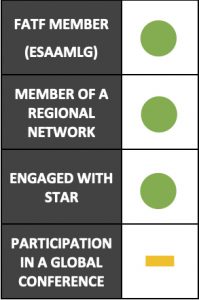Overview
Despite the commitments and bold statements of several Kenya’s presidents to lead a war on corruption,[1],[2] corruption levels in Kenya have stagnated and continue to be high. The 2019 Transparency International Corruption Perception Index places Kenya in the bottom half of Sub-Saharan Africa and in the bottom third worldwide.[3] Kenya ranks ninth in terms of the risk of money laundering, according to the Basel Anti-Money Laundering Index, making it vulnerable to become both a country of origin, as well as a destination for stolen money.
The fact that public officials are using their power for their private gain in practice means that about a one third of the country’s budget, or 6 billion USD, could be lost annually due to corruption.[4] Ongoing scandals reveal how public money is being stolen through public procurement and how bribes are made and taken when business is done[5]. About one in every three companies reports experiencing fraud in procurement[6], and concerns about a lack of accountability exist not only at the level of the state but also in county governments[7].
Corruption within security forces is also high and is one of the major obstacles towards effective counterterrorism efforts to tackle the attacks from al-Shabab, an al-Qaida affiliate originating in neighbouring Somalia.[8]
Asset Recovery Cases
In 2018, the Framework for the Return of Assets from Corruption and Crime in Kenya (FRACCK) was set up between Kenya, Jersey, Switzerland and the UK, to facilitate the confiscation and recovery of assets acquired through corruption and crime in Kenya and subsequently hidden in those countries.[9]
The primary cause for FRACCK was a corruption case involving Kenya Power and Lighting Company head Samuel Gichuru and former Finance Minister Chris Okemo who hid kickback money in Jersey accounts. A Jersey-registered company Windward Trading cooperated during the investigation and pleaded guilty, which resulted the return of 3,777,000 USD in 2018.[10]
Another successful case concerned the return of money originating from bribe payments of the UK company Smith & Ouzman in the so-called Chickengate scandal. In line with the UK government’s policy, the authorities decided that the recovered amount of 349,057 USD should be used to purchase specialised ambulances and not go to back to Kenya’s general budget.[11]
Probably the biggest and most infamous scandal is the Anglo-Leasing Case, where 18 contracts between the Kenyan government and a number of domestic and foreign companies were made for overpriced security equipment and services, totalling 770 million USD. These contracts were initiated under the presidency of Daniel Arap Moi in 1990s and continued during the presidency of Mwai Kibaki.[12] Due to the fact that some of the companies involved voluntarily returned the full amounts relating to their contracts, 13,248,234 USD of this illicit money was likely returned from Switzerland in 2004,[13] and a further approx. 2 million USD is in the process of being recovered.[14] A court ruling in Kenya is currently pending and, until a final decision is reached, the funds are frozen, waiting to be returned.
International Institutional Engagement
Kenya is a member of Eastern and Southern Africa Anti-Money Laundering Group (ESAAMLG), a regional body implementing the FATF Forty Recommendations. The latest FATF report published in 2011 found Kenya compliant with one recommendation, largely compliant with one recommendation, partially compliant with 15 recommendations, and non- compliant with 23 of the FATF 40 Recommendations.[15] Since then, however, the country has made considerable steps to redress the shortcomings in key areas, such as setting up a Financial Intelligence Unit and adopting legislation to identify of beneficial owners of companies, however, areas of further improvement exist.[16]
Kenya is a member to Asset Recovery Inter-Agency Network for Eastern Africa (ARIN-EA). This is an informal network which aims to exchange information on individuals, assets and companies, both at the regional and international level.
Despite Kenya not being a focus country at the Global Forum for Asset Recovery, nor any regional equivalent, the country has been engaged with the StAR initiative.[17]

References
[1] https://www.opensocietyfoundations.org/voices/war-against-corruption-kenya
[2] https://www.dw.com/en/kenyattas-war-on-corruption-draws-online-ire/a-18874352
[3] https://www.transparency.org/cpi2019
[4] https://www.reuters.com/article/us-kenya-corruption/third-of-kenyan-budget-lost-to-corruption-anti-graft-chief-idUSKCN0WC1H8
[5] https://www.nation.co.ke/news/Big-corruption-scandal-amounts-that-shook-Kenyans-in-2018/1056-4915472-m10u9bz/index.html
[6] https://www.pwc.com/ke/en/assets/pdf/gecs2016-report.pdf
[7] https://africog.org/wp-content/uploads/2015/10/Public-Procurement-in-Kenyas-Counties1.pdf
[8] https://www.brookings.edu/blog/order-from-chaos/2019/08/22/corruption-and-terrorism-the-case-of-kenya/
[9] https://www.baselgovernance.org/news/fracck-agreement-kenya-illustrates-partnership-essential-when-disposal-confiscated-assets
[10] https://star.worldbank.org/corruption-cases/node/18426
[11] https://www.baselgovernance.org/news/first-ever-uk-conviction-corporate-foreign-bribery-kenya
[12] https://www.ft.com/content/bf75a7ee-c7f9-11e4-8210-00144feab7de
[13] https://star.worldbank.org/corruption-cases/node/18485
[14] https://businesstoday.co.ke/swiss-govt-seizes-sh200-million-looted-in-anglo-leasing-scandal/
[15] https://esaamlg.org/reports/Kenya%20R.pdf
[16] https://esaamlg.org/reports/Progress%20Report%20Kenya-2018.pdf
[17] https://star.worldbank.org/star/content/milestone-stolen-asset-recovery
